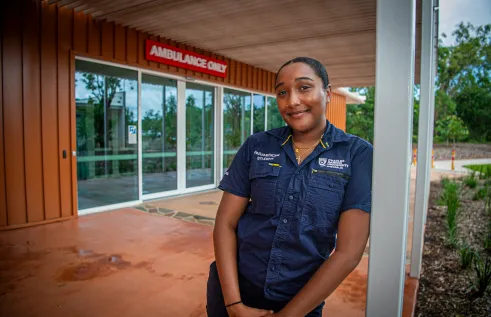People quarantined at NT’s COVID-19 facility suffered low psychological distress, report finds
The psychological distress of people in Northern Territory’s COVID-19 quarantine facility was low because those in the facility realised its importance in controlling the pandemic, according to a Charles Darwin University (CDU) study.
People housed in the Howard Springs facility (HSF) on the outskirts of Darwin had the low levels of psychological distress, with those arriving from Melbourne – who had left tough restrictions in their home state – having the lowest stress of all, the study found.
“While there was no noticeable difference in stress levels between ages or genders there was lower levels of stress exhibited by people who came to quarantine from Melbourne,” said lead author and CDU Menzies School of Medicine clinical Professor David Mitchell.
Professor Mitchell, who is also a CDU adjunct associate professor, said the survey was done when Melbourne was going through the second wave of the pandemic in Victoria, when the government had in place far-reaching restrictions.
“Possibly any inherent hardship in the HSF facility was mitigated in this group, whom whilst facing the restrictions of supervised quarantine had negotiated their way out of a lock-down in Victoria.”
COVID-19 restrictions gave health researchers and psychologists from Royal Darwin Hospital and CDU a unique opportunity to study the effects of health quarantine on residents.
The results of the study, published in the Journal of Psychiatric and Mental Health Nursing, revealed that psychological distress was low.
Professor Mitchell said despite low psychological distress there were triggers present that residents experienced, such as feeling a lack of control, and ideas of not being heard in communication protocols.
“Despite any perceived adversity there was an overwhelming sense of quarantine being important and necessary,” Professor Mitchell said.
As part of the study, researchers analysed a sample group of people quarantined at Howard Springs’ facility in the Northern Territory for signs of psychological distress, along with semi-structured interviews with detainees and health works on site.
Professor Mitchell said there were some limitations to the study as it only sampled a snapshot of life in quarantine and did not identify changes in attitudes over time.
“A more rigorous method may have been to sample two or more points in time during the quarantine process to discern temporal changes in psychological distress,” Professor Mitchell said.
The research revealed that if residents had a sense of control, if there was open communication between residents and health professionals, and if there was peer support, then psychological distress was low.
The research was a collaboration between CDU, National Critical Care and Trauma Response Centre. Top End Mental Health, and Northern Territory Public Health Directorate.
“Much of the success of Howard Springs comes down to the excellent leadership of Professor Di Stephens and Lisa Vermeulen and their collaboration with Public Health Directorate through Dr Danielle Esler,” Professor Mitchell said.
CDU Menzies School of Medicine is the partnership between Charles Darwin University and Menzies School of Health Research.
Read the full research paper here.
Related Articles

2000 students filter into $30.8 million health teaching and training facility
More than 2000 students from 10 health disciplines are set to filter into Charles Darwin University’s (CDU) newly-completed $30.8 million Centre for Better Health Futures throughout 2026.
Read more about 2000 students filter into $30.8 million health teaching and training facility
Paramedic student’s unusual path to uni proves ATAR isn’t everything
Tens of thousands of school leavers are considering their university offers, putting their hard-earned ATAR to use. But what about the students who didn’t get the ATAR they’d hoped for?
Read more about Paramedic student’s unusual path to uni proves ATAR isn’t everything
First medical students welcomed to CDU by Prime Minister
Australian Prime Minister Anthony Albanese was in Darwin to meet some of Charles Darwin University’s (CDU) School of Medicine first students, reiterating the importance of the program to the Northern Territory in securing the future health workforce.
Read more about First medical students welcomed to CDU by Prime Minister
